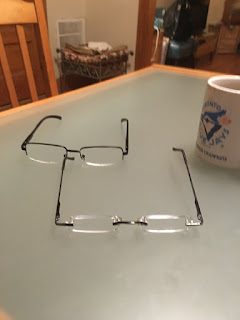Recently, two people I cared about deeply have died. One is an old lover. The other is a fellow blogger. I'll write soon about the old lover, and today the blogger.
Back around 2006, I started this blog. Over the next year, a little blogging family started. It was remarkably diverse. Over time, as social media became a thing, there was less blogging and more Facebooking. One guy who never stopped blogging was Erik Donald France, who continued his wonderful blog Erik's Choice.
A few weeks ago, I noticed that both his Facebook posts and blog had stopped being updated. With a little fear, I ran a search, and my fears were confirmed: Eric had died of cancer in December, 2018.
He was a fascinating guy. I had always assumed that when I was done with having kids in college, and was more free to travel and spend money, that I would meet him in real life. We had emailed back and forth a few times over the years. He was a college professor, and had a seemingly limitless capacity to be interested in things-- literature, history, art, cinema, the military, geography, science. There seemed to be nothing he did not find interesting. He could be writing about the American Civil War and he would tie it to something unlikely. He was as fascinated by 19th century events as he was French New Wave cinema. He wrote about events that had nothing to do with him, and he wrote about events that touched him personally, like the murder of a Chapel Hill bookstore owner, Bob Sheldon, in 1991. His last blog posts and social media posts were just a couple of weeks before his death.
I feel a deep sense of loss and sadness. The world was a more interesting and beautiful place with Eric Donald France in it. He shall be missed.
Back around 2006, I started this blog. Over the next year, a little blogging family started. It was remarkably diverse. Over time, as social media became a thing, there was less blogging and more Facebooking. One guy who never stopped blogging was Erik Donald France, who continued his wonderful blog Erik's Choice.
A few weeks ago, I noticed that both his Facebook posts and blog had stopped being updated. With a little fear, I ran a search, and my fears were confirmed: Eric had died of cancer in December, 2018.
He was a fascinating guy. I had always assumed that when I was done with having kids in college, and was more free to travel and spend money, that I would meet him in real life. We had emailed back and forth a few times over the years. He was a college professor, and had a seemingly limitless capacity to be interested in things-- literature, history, art, cinema, the military, geography, science. There seemed to be nothing he did not find interesting. He could be writing about the American Civil War and he would tie it to something unlikely. He was as fascinated by 19th century events as he was French New Wave cinema. He wrote about events that had nothing to do with him, and he wrote about events that touched him personally, like the murder of a Chapel Hill bookstore owner, Bob Sheldon, in 1991. His last blog posts and social media posts were just a couple of weeks before his death.
I feel a deep sense of loss and sadness. The world was a more interesting and beautiful place with Eric Donald France in it. He shall be missed.








